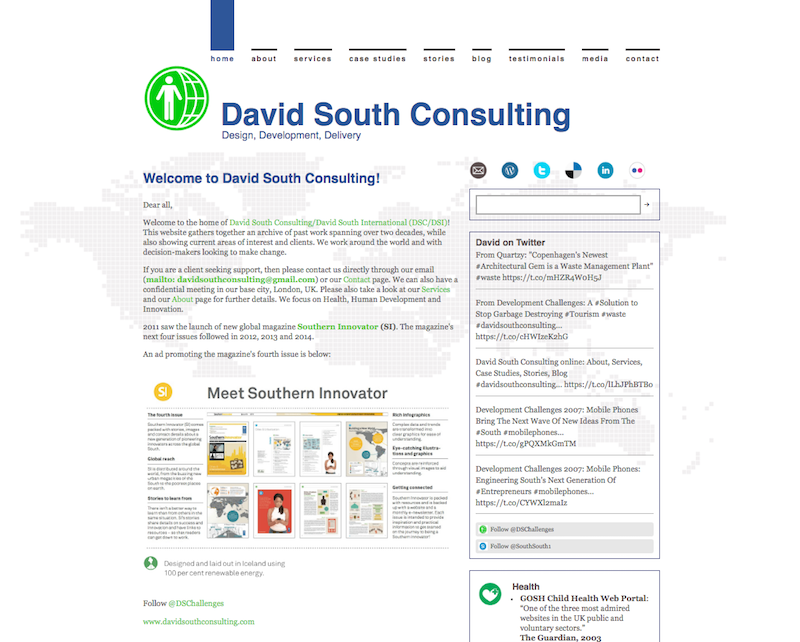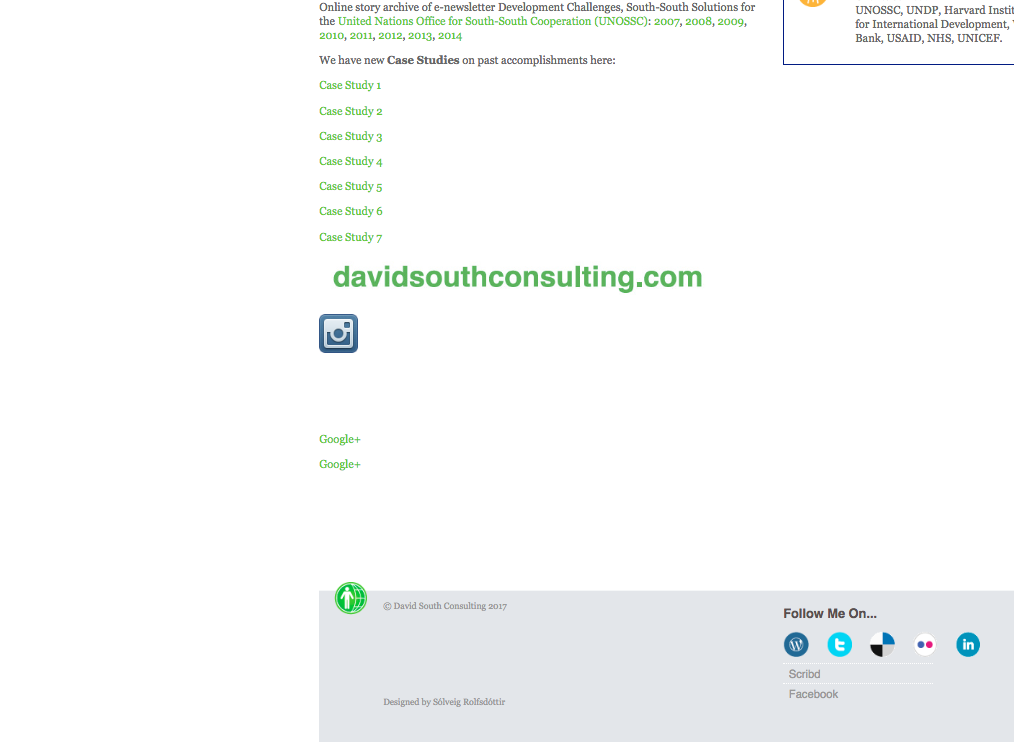Stories @ David South Consulting | 1991 - 2017
 Tuesday, July 11, 2017 at 11:57AM
Tuesday, July 11, 2017 at 11:57AM

I worked as a journalist for magazines and newspapers from 1991 to 1997 in Canada and the United Kingdom and as a radio host for a weekly spoken word interview programme, Word of Mouth (CKLN-FM). This included working as an investigative journalist for Now Magazine, “Toronto’s alternative news and entertainment source”, as a Medical and Health Correspondent for Today’s Seniors, and as an investigative journalist and reporter for two Financial Times newsletters, New Media Markets and Screen Finance.
From 2007, I researched and wrote stories for two United Nations publications: e-newsletter Development Challenges, South-South Solutions and magazine Southern Innovator. Links to a small sample of published stories by theme are below:
Themes
Health and Medical
African Health Data Revolution
African Technology Tackles Health Needs
Changing Health Care Careers a Sign of the Times
Feds Call for AIDS, Blood System Inquiry: Some Seniors Infected
Health Care on the Cutting Block: Ministry Hopes for Efficiency with Search and Destroy Tactics
Mobile Phone Microscopes to Revolutionize Health Diagnostics
Safe Healthcare is Good Business and Good Health
Take Two Big Doses of Humanity and Call Me in the Morning
Taking Medicine to the People: Four Innovators in Community Health
Thai Organic Supermarkets Seek to Improve Health
US Health Care Businesses Chasing Profits into Canada
Innovation and Innovators
Frugal Innovation Trend Meets Global South's Innovation Culture
Innovation from the Global South
Innovation Villages Tackling MDGs
Innovations in Green Economy: Top Three Agenda
Innovative Stoves to Help the Poor
Kenyan Mobile Phone Innovations
Next Generation of Innovation for the Grassroots
Technological Innovation Alive in Brazil
International Development
Philippine Conference Tackles Asia's AIDS Crisis
Starting from Scratch: the Challenge of Transition
State of Decay: Haiti Turns to Free-Market Economics and the UN to Save Itself
Traffic Signs Bring Safety to the Streets
Investigative Journalism
False Data Makes Border Screening Corruptible
New Student Group Seeks 30 Percent Tuition Hike
Somali Killings Reveal Ugly Side of Elite Regiment
Study Says Jetliner Air Quality Poses Health Risks: CUPE Takes on Airline Industry with Findings
Top Reporters Offer Military Media Handling Tips
Science
Affordable Space Programmes Becoming Part of South's Development
African Botanicals to be Used to Fight Against Parasites
African Digital Laser Breakthrough Promises Future Innovation
African Farming Wisdom Now Scientifically Proven
An Innovator's 'Big Chicken Agenda' for Africa
China Pushing Frontiers of Medical Research
New 3D Technology Makes Innovation Breakthough and Puts Mind Over Matter
 David South,
David South,  David South Consulting,
David South Consulting,  David South International,
David South International,  fact-based journalism,
fact-based journalism,  health,
health,  innovation,
innovation,  innovators,
innovators,  international development,
international development,  investigative journalism,
investigative journalism,  medical,
medical,  newsletter,
newsletter,  science in
science in  David South Consulting,
David South Consulting,  Development Challenges, South-South Solutions,
Development Challenges, South-South Solutions,  Magazine Stories 1990s,
Magazine Stories 1990s,  Southern Innovator Magazine,
Southern Innovator Magazine,  UNDP Innovator Stories
UNDP Innovator Stories 

